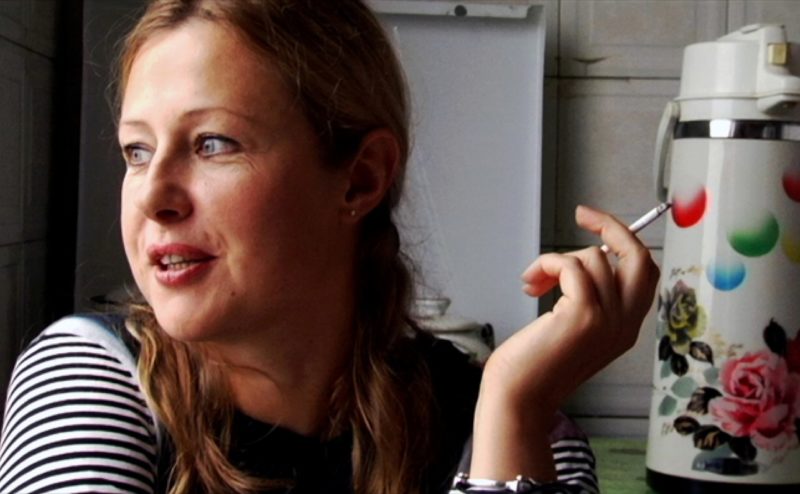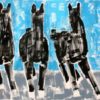
Film Festivals | Filmmaking | Interviews | Massachusetts
But You Can’t Take the Republic Out of the Russians
Written by B. Walter Irvine | Posted by: NewEnglandFilm.com
Robin Hessman sums up the challenge of documentary filmmaking this way: “It’s sort of like ‘choose your own adventure.’ There are so many points, when you start down a path, you can’t go back.”
Hessman could have been talking just as well about the subject of her documentary My Perestroika, which will screen as part of the Boston Jewish Film Festival in early November. My Perestroika follows the personal experiences of five Russians as the country transitions from Communist to democratic rule. After years spent studying film in Russia, Hessman planned to make the film in part to explain modern Russia to American friends without resorting to glib summaries. She could only begin the process, she said, by exhibiting “willful ignorance at the moment of starting about how long it’s going to take.” For her, the topic was a natural choice. Growing up in Andover, Massachusetts, she had subscribed to Soviet Life magazine out of fascination for that great big empire over there. Later, inspired by the fall of the Berlin Wall, she went to Leningrad at 18, and spent years living there.
“I would love to be able to put in this magical DVD that would show me who I would be if I had never been to Russia,” she said. “I don’t even know what part of my world outlook is from there or from here, it’s so much meddled into my general identity.”
She wanted to examine the Soviet and Russian experience through both history and the individuals who lived through it, so she combined archival material and home movies with her own footage of five classmates from a school in Moscow. “I did look for films I could use as a helpful model, but I didn’t really find any,” Hessman explained, although she was inspired by Péter Forgács and Alan Berliner. “I love how Alan Berliner plays with footage. He has a playful way of having the interaction between archival and home footage playing with whatever’s going on in present,” she said.
That historical material of My Perestroika shows a world with a slightly alien look, at once familiar and different from our own aesthetic past. In the present, too, we can see the material world of Russia as Hessman’s camera roves around while people speak, picking up incidentals that give the film a dreamy flavor. This is only enhanced by intercuts with the past that give a strong sense of history repeating itself.
Over the course of the film, as Communism collapses, Hessman’s subjects “basically have to figure out how to be adults in a world nobody could ever prepare them for,” she explained. “In 1988 they canceled history exams because no one knew what the right answers were going to be, because so many things were being revealed that had never been discussed before.” She eventually chose to follow a family with two history teachers precisely because they were acutely aware of this issue. “Over the decade, they see a fault line where the things that were like air when they were children are foreign to the children they teach. It’s like ancient Rome to them.” One of the history teachers, Lyuba, sees the Soviet situation as utterly perplexing and difficult to explain, “Because all normal functioning minds, and especially the minds of kids, are simply incapable of comprehending it.”
Despite their shared experiences, the characters distinguish themselves in different niches of the post-Soviet Russia. Borya and Lyuba are history teachers, Andrei owns a store selling fine shirts, and Ruslin is a former punk guitarist. “There are moments where one person tells us one thing, and then someone else tells us something completely different,” Hessman observed. This allows an open reading of the film. “What works best for me is when each individual audience member forms their own conclusions and gets their own perspective,” she said.
It’s funny to find that, though the film is a tale of Russia, much of the historical film seems familiar. Credulous announcers propagate a myth of perpetual social progress, focusing on a few people who seem, in today’s world, hopelessly sincere. In the film, Borya remembers that, for him, “By eighth or ninth grade, it became clear that people all around you were saying things that didn’t correspond at all with reality.” It’s a sentiment that could be voiced by many Americans throughout history as well.
Hessman says that other Americans have been surprised to find that the film feels familiar. “I think Robin’s perceptive film helps those of us who are not Russian-speaking or recent immigrants from Russia to understand more about an important part of the Boston and Boston Jewish communities,” said Sarah Rubin, Artistic Director of the Boston Jewish Film Festival. And indeed, the film is a way that we may see what might have been, had we chosen a different adventure.
Find out when you can see a screening of My Perestroika as part of the Boston Jewish Film Festival here: http://bjff.bside.com/2010/films/myperestroika_bjff2010.
Find out when you can see a screening of My Perestroika as part of the Boston Jewish Film Festival here: http://bjff.bside.com/2010/films/myperestroika_bjff2010.











